Watched July 2 - 8, 2007: Imai, J and K Ichikawa, Hashinobu, Ozu -- and Music
Yamabiko Gakko / Echoes from a Mountain School (Tadashi Imai, 1952)
 Yamabiko Gakko was the name of a collection of personal stories written by the students of an elementary school in a mountain village. The teacher who collected the stories belonged to a movement that sought to promote truly democratic education in post-war Japan, focusing on both practical education and personal development. Imai's film is based on these stories -- and shows the methods used and the response of both children and their families to the educational program.
Yamabiko Gakko was the name of a collection of personal stories written by the students of an elementary school in a mountain village. The teacher who collected the stories belonged to a movement that sought to promote truly democratic education in post-war Japan, focusing on both practical education and personal development. Imai's film is based on these stories -- and shows the methods used and the response of both children and their families to the educational program. 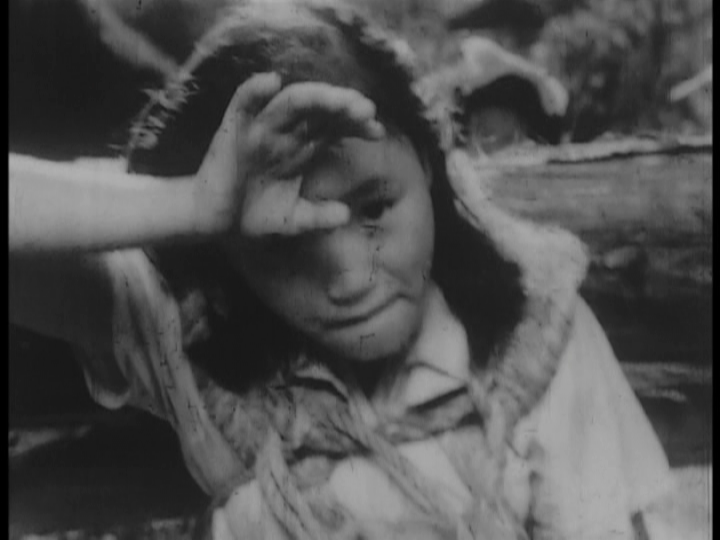 While not a documentary, the film has very much the look and feel on being one. There is no plot as such, but one persistent thread deals with a good student who is often absent due to the illness of his mother. After she dies, he writes a story about her life -- and his classmates work together to illustrate and publish the story (using a mimeograph and wood block printing). An earnest and somewhat didactic film, but not an over-earnest or pedantic one. Visually, this is somewhat evocative of early Soviet cinema.
While not a documentary, the film has very much the look and feel on being one. There is no plot as such, but one persistent thread deals with a good student who is often absent due to the illness of his mother. After she dies, he writes a story about her life -- and his classmates work together to illustrate and publish the story (using a mimeograph and wood block printing). An earnest and somewhat didactic film, but not an over-earnest or pedantic one. Visually, this is somewhat evocative of early Soviet cinema.
http://i9.photobucket.com/albums/a59/mkerpan/imai/gakko/yamabiko02.png
http://i9.photobucket.com/albums/a59/mkerpan/imai/gakko/yamabiko03.png
http://i9.photobucket.com/albums/a59/mkerpan/imai/gakko/yamabiko04.png
http://i9.photobucket.com/albums/a59/mkerpan/imai/gakko/yamabiko07.png
http://i9.photobucket.com/albums/a59/mkerpan/imai/gakko/yamabiko08.png
http://i9.photobucket.com/albums/a59/mkerpan/imai/gakko/yamabiko09.png
http://i9.photobucket.com/albums/a59/mkerpan/imai/gakko/yamabiko10.png
http://i9.photobucket.com/albums/a59/mkerpan/imai/gakko/yamabiko11.png
http://i9.photobucket.com/albums/a59/mkerpan/imai/gakko/yamabiko12.png
http://i9.photobucket.com/albums/a59/mkerpan/imai/gakko/yamabiko13.png
http://i9.photobucket.com/albums/a59/mkerpan/imai/gakko/yamabiko14.png
http://i9.photobucket.com/albums/a59/mkerpan/imai/gakko/yamabiko15.png
http://i9.photobucket.com/albums/a59/mkerpan/imai/gakko/yamabiko16.png
Ana / The Hole (Kon Ichikawa, 1957)
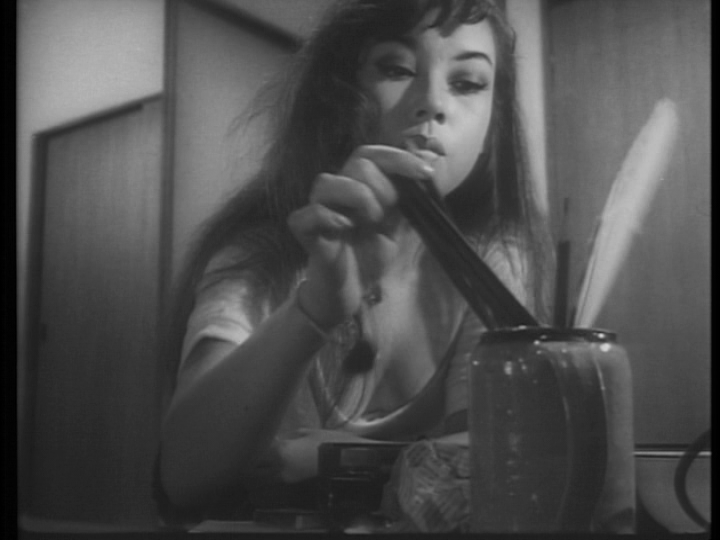 Machiko Kyo plays a Nancy Drew-esque young reporter who gets into hot water while investigating financial hanky panky at the local level. Her troubles increase when a local bank boss (So Yamamura) and his henchman (Ichikawa stalwart Eiji Fukanoshi) come up with a plan to frame her for the murder of a witness they plan to eliminate.
Machiko Kyo plays a Nancy Drew-esque young reporter who gets into hot water while investigating financial hanky panky at the local level. Her troubles increase when a local bank boss (So Yamamura) and his henchman (Ichikawa stalwart Eiji Fukanoshi) come up with a plan to frame her for the murder of a witness they plan to eliminate. 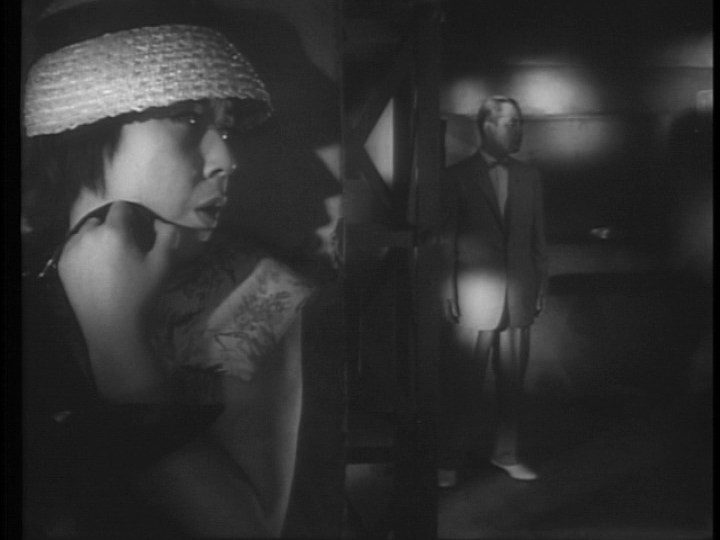 The plot here doesn't seem to make a great deal of sense, but the cast and the cinematography are both splendid. Machiko Kyo is a delight -- and gets to wear various disguises. Lots of fun here -- but it doesn't seem to have ever been released with English subtitles (I don't think it's been included in any retrospective).
The plot here doesn't seem to make a great deal of sense, but the cast and the cinematography are both splendid. Machiko Kyo is a delight -- and gets to wear various disguises. Lots of fun here -- but it doesn't seem to have ever been released with English subtitles (I don't think it's been included in any retrospective).
http://i9.photobucket.com/albums/a59/mkerpan/ichikawa_kon/hole/ana01.png
http://i9.photobucket.com/albums/a59/mkerpan/ichikawa_kon/hole/ana02.png
http://i9.photobucket.com/albums/a59/mkerpan/ichikawa_kon/hole/ana03.png
http://i9.photobucket.com/albums/a59/mkerpan/ichikawa_kon/hole/ana04.png
http://i9.photobucket.com/albums/a59/mkerpan/ichikawa_kon/hole/ana05.png
http://i9.photobucket.com/albums/a59/mkerpan/ichikawa_kon/hole/ana06.png
http://i9.photobucket.com/albums/a59/mkerpan/ichikawa_kon/hole/ana08.png
http://i9.photobucket.com/albums/a59/mkerpan/ichikawa_kon/hole/ana09.png
http://i9.photobucket.com/albums/a59/mkerpan/ichikawa_kon/hole/ana10.png
http://i9.photobucket.com/albums/a59/mkerpan/ichikawa_kon/hole/ana11.png
http://i9.photobucket.com/albums/a59/mkerpan/ichikawa_kon/hole/ana12.png
http://i9.photobucket.com/albums/a59/mkerpan/ichikawa_kon/hole/ana13.png
http://i9.photobucket.com/albums/a59/mkerpan/ichikawa_kon/hole/ana14.png
http://i9.photobucket.com/albums/a59/mkerpan/ichikawa_kon/hole/ana15.png
http://i9.photobucket.com/albums/a59/mkerpan/ichikawa_kon/hole/ana17.png
http://i9.photobucket.com/albums/a59/mkerpan/ichikawa_kon/hole/ana18.png
http://i9.photobucket.com/albums/a59/mkerpan/ichikawa_kon/hole/ana19.png
http://i9.photobucket.com/albums/a59/mkerpan/ichikawa_kon/hole/ana20.png
http://i9.photobucket.com/albums/a59/mkerpan/ichikawa_kon/hole/ana21.png
Watashi wa kani ni naritai / I Want to Be a Shellfish (Shinobu Hashimoto, 1959)
 Hashimoto is best known as one of Japan's leading screenplay writer (for films of Kurosawa, Kobayashi and Nomura, among others). This film, however, was the first of two actually directed by him as well. It tells the story of a provincial barber (played by popular comedian Frankie Sakai) who is ordered to kill a captured bomber crew member, while serving as a common soldier during World War II. After the war, he returns home to his wife (Michiyo Aratama) and child and barber shop, only to be arrested as a war criminal.
Hashimoto is best known as one of Japan's leading screenplay writer (for films of Kurosawa, Kobayashi and Nomura, among others). This film, however, was the first of two actually directed by him as well. It tells the story of a provincial barber (played by popular comedian Frankie Sakai) who is ordered to kill a captured bomber crew member, while serving as a common soldier during World War II. After the war, he returns home to his wife (Michiyo Aratama) and child and barber shop, only to be arrested as a war criminal.  The occupation military has no sympathy for his (absolutely truthful) claim that refusing his commanding officer's order to kill the prisoner would have been punishable by summary execution. His family and friends are stunned when they hear the news. Crushed at first, he and his wife recover their spirits as they begin to think his sentence might be commuted. No clemency arrives, and Chishu Ryu, as a Buddhist priest (possibly his debut in a type of role he would play many times in later years), tries to prepare him for his miserable fate.
The occupation military has no sympathy for his (absolutely truthful) claim that refusing his commanding officer's order to kill the prisoner would have been punishable by summary execution. His family and friends are stunned when they hear the news. Crushed at first, he and his wife recover their spirits as they begin to think his sentence might be commuted. No clemency arrives, and Chishu Ryu, as a Buddhist priest (possibly his debut in a type of role he would play many times in later years), tries to prepare him for his miserable fate.
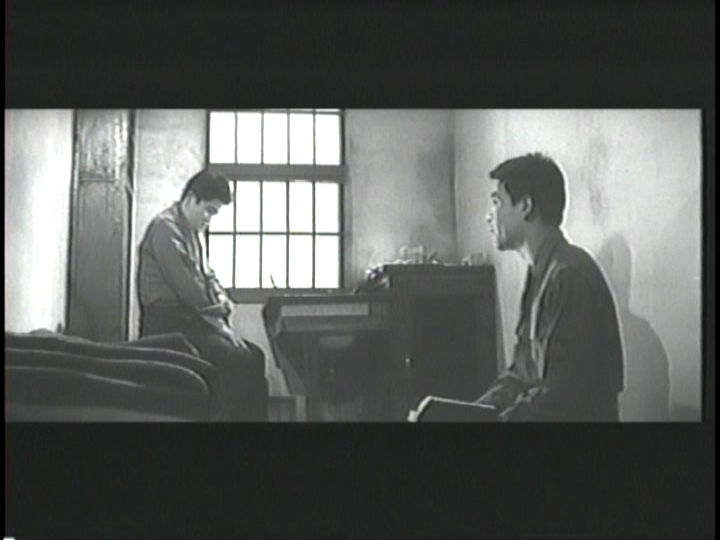 I was shocked to learn that the US military courts did indeed execute common soldiers for following orders that they could not legally refuse (under Japanese law). I was also surprised to learn that such soldiers were tried for murder (and convicted) even when prisoners they were ordered to execute had been found guilty of war crimes by Japanese military tribunals (and bombing civilian targets WAS a capital crime under international law at that time). Many high-ranking officials escaped punishment, as they could afford expert legal representation -- but low-ranking individuals were not so fortunate.
I was shocked to learn that the US military courts did indeed execute common soldiers for following orders that they could not legally refuse (under Japanese law). I was also surprised to learn that such soldiers were tried for murder (and convicted) even when prisoners they were ordered to execute had been found guilty of war crimes by Japanese military tribunals (and bombing civilian targets WAS a capital crime under international law at that time). Many high-ranking officials escaped punishment, as they could afford expert legal representation -- but low-ranking individuals were not so fortunate.
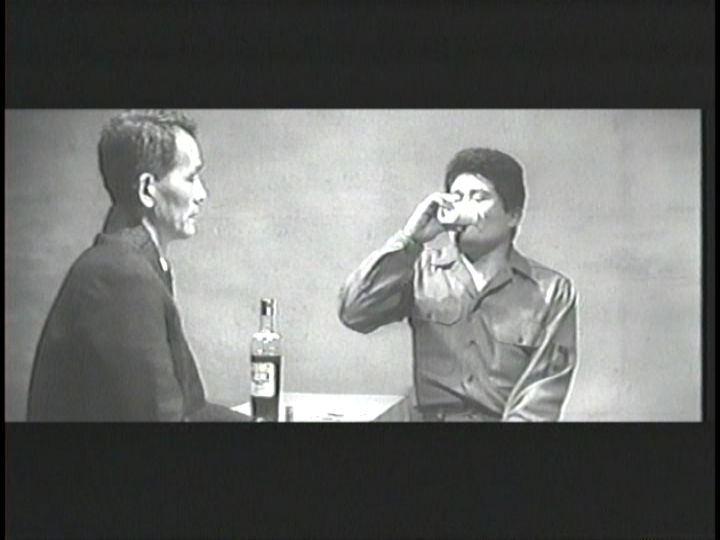 While this film tells a compelling story and the script is a good one (there was a previous television play version -- and a new version is currently in the process of being made), Hashimoto doesn't seem to have a good sense of cinematic (as opposed to theatrical) rhythm and timing. Despite the assistance of great cinematographer Asakazu Nakai, this film often feels decidedly un-cinematic. Still, it is a wrthy enough effort -- and it would be nice if there was an English-subbed version.
While this film tells a compelling story and the script is a good one (there was a previous television play version -- and a new version is currently in the process of being made), Hashimoto doesn't seem to have a good sense of cinematic (as opposed to theatrical) rhythm and timing. Despite the assistance of great cinematographer Asakazu Nakai, this film often feels decidedly un-cinematic. Still, it is a wrthy enough effort -- and it would be nice if there was an English-subbed version.
http://i9.photobucket.com/albums/a59/mkerpan/jul_07/shellfish01.png
http://i9.photobucket.com/albums/a59/mkerpan/jul_07/shellfish04.png
http://i9.photobucket.com/albums/a59/mkerpan/jul_07/shellfish06.png
http://i9.photobucket.com/albums/a59/mkerpan/jul_07/shellfish07.png
http://i9.photobucket.com/albums/a59/mkerpan/jul_07/shellfish08.png
Kohayagawa-ke no aki / Autumn of the Kohyagawa Family / End of Summer (Yasujiro Ozu, 1961)
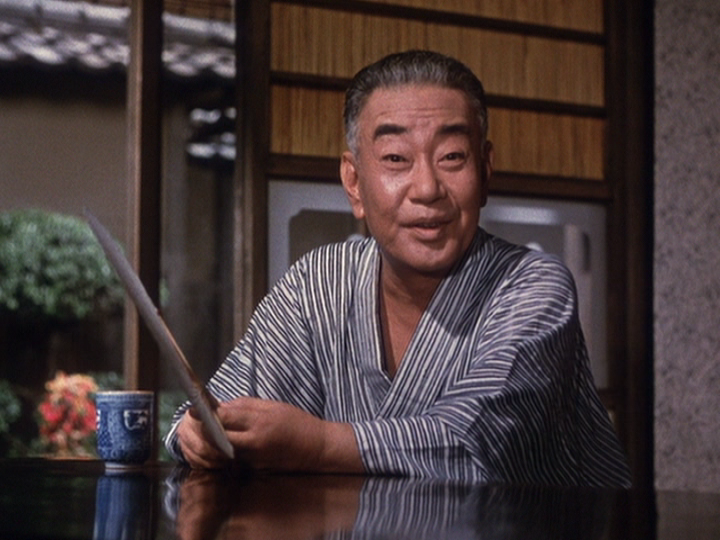 For some reason, critical commentators typically refer to this as one of Ozu's bleakest films -- and claim this is one of his most conservative as well. In fact, though the patriarch of the family (and the family brewery business) is an engaging codger (played by kabuki star Ganjiro Nakamura), he is also selfish and irresponsible. Although loved well-enough by his family, he is nonetheless a blighting influence --
For some reason, critical commentators typically refer to this as one of Ozu's bleakest films -- and claim this is one of his most conservative as well. In fact, though the patriarch of the family (and the family brewery business) is an engaging codger (played by kabuki star Ganjiro Nakamura), he is also selfish and irresponsible. Although loved well-enough by his family, he is nonetheless a blighting influence -- 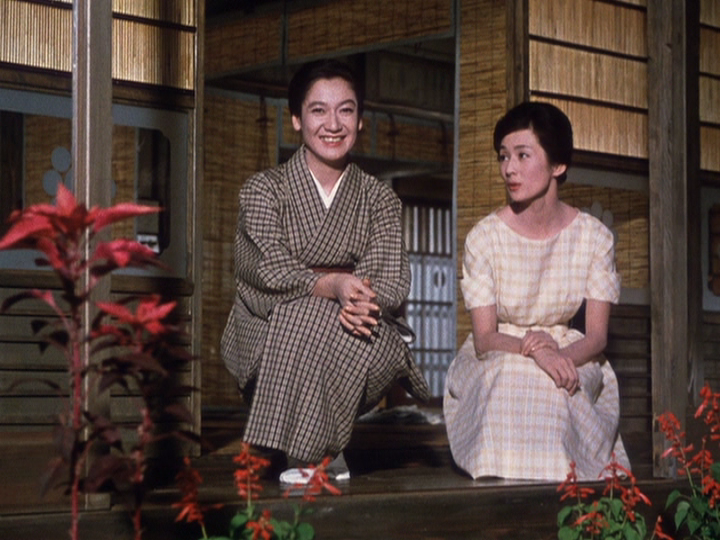 especially as regards the unmarried females of the family, his widowed daughter-in-law (Setsuko Hara) and his youngest daughter (Yôko Tsukasa). He is pressuring both women into marital arrangements that they oppose. He also is driving his eldest daughter (Michiyo Aratama) and her good-natured husband (Keiju Kobayashi) to distraction.
especially as regards the unmarried females of the family, his widowed daughter-in-law (Setsuko Hara) and his youngest daughter (Yôko Tsukasa). He is pressuring both women into marital arrangements that they oppose. He also is driving his eldest daughter (Michiyo Aratama) and her good-natured husband (Keiju Kobayashi) to distraction. 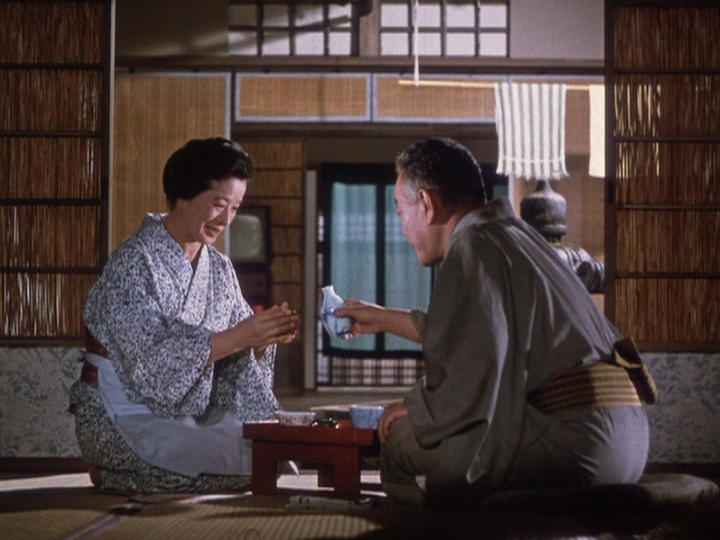 As it turns out, the patriarch (whose wife died a year earlier) had run into an old flame (Chieko Namiwa) by accident -- and he now sneaks off to visit her and his purported daughter (Reiko Dan). This daughter has a fondness for young American men (played by various Europeans with quite non-American accents) -- and is always trying to wheedle her "father" into buying her a fur coat. The patriarch has a mild stroke, which slows him down temporarily.
As it turns out, the patriarch (whose wife died a year earlier) had run into an old flame (Chieko Namiwa) by accident -- and he now sneaks off to visit her and his purported daughter (Reiko Dan). This daughter has a fondness for young American men (played by various Europeans with quite non-American accents) -- and is always trying to wheedle her "father" into buying her a fur coat. The patriarch has a mild stroke, which slows him down temporarily. 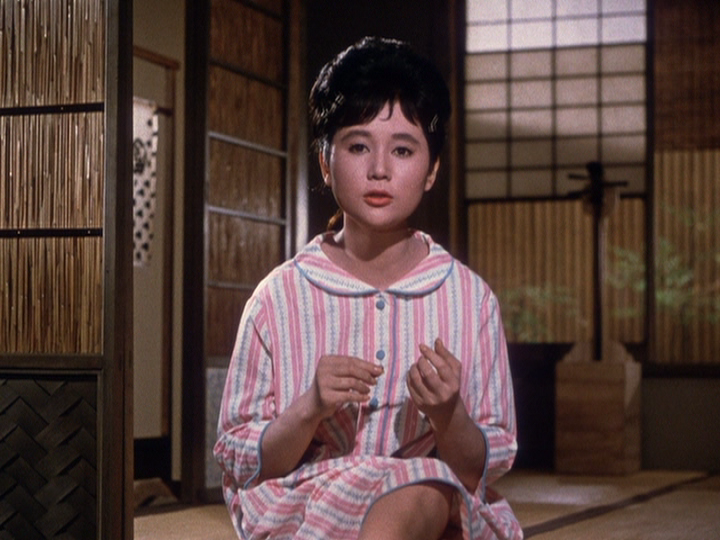 But he soon returns to his old tricks -- and is felled by a fatal stroke while visiting his old flame. On the day of the funeral, Hara's and Tsukasa's characters can't avoid showing relief over the fact that they can now make their own choices -- Hara to remain a single parent, Tsukasa to move to the other side of Japan, to marry a former co-worker. Meanwhile, Chishu Ryu and Yuko Mochizuki, as farmers living near the crematorium, serve as a sort of Greek chorus -- along with a neighboring flock of crows.
But he soon returns to his old tricks -- and is felled by a fatal stroke while visiting his old flame. On the day of the funeral, Hara's and Tsukasa's characters can't avoid showing relief over the fact that they can now make their own choices -- Hara to remain a single parent, Tsukasa to move to the other side of Japan, to marry a former co-worker. Meanwhile, Chishu Ryu and Yuko Mochizuki, as farmers living near the crematorium, serve as a sort of Greek chorus -- along with a neighboring flock of crows.
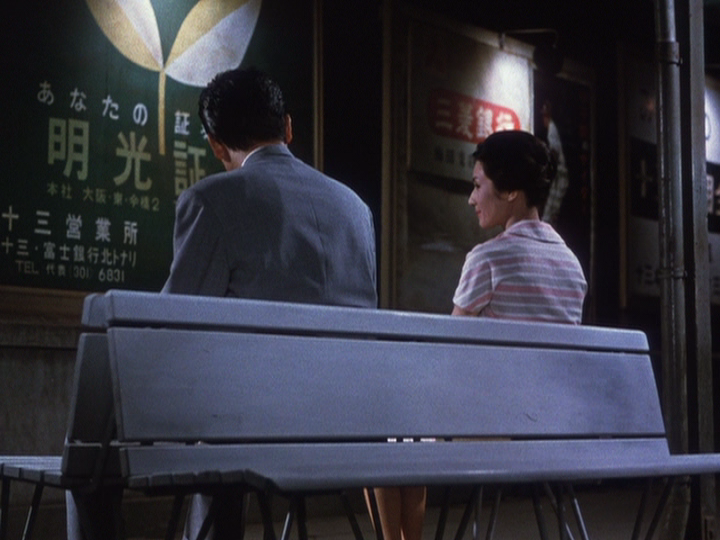 This is Ozu's second most visually gorgeous color film, right behing Floating Weeds (though all his color films are quite lovely) -- with a palette rich is greens, reds, golds and browns. (If you watch this, take the "spot the bottle of Tabasco sauce" challenge). The cinematography by Asakazu Nakai is quite fine, though not quite as extravagant as Miyagawa's work in Floating Weeds. The score by Toshiro Mayufumi is often wonderful (with a sort of jazzy, Kurt Weill-ish sound), but other times (especially near the end) atypically over-bearing in a very un-Ozu-like fashion (
This is Ozu's second most visually gorgeous color film, right behing Floating Weeds (though all his color films are quite lovely) -- with a palette rich is greens, reds, golds and browns. (If you watch this, take the "spot the bottle of Tabasco sauce" challenge). The cinematography by Asakazu Nakai is quite fine, though not quite as extravagant as Miyagawa's work in Floating Weeds. The score by Toshiro Mayufumi is often wonderful (with a sort of jazzy, Kurt Weill-ish sound), but other times (especially near the end) atypically over-bearing in a very un-Ozu-like fashion ( perhaps Ozu did not have the final word on the music here -- as he was on loan to Toho for this film). The acting is first-rate -- including the supporting roles. Toho super-star Hisaya Morishige, taking advantage of Ozu's one-time-only"visit" to Toho, practically insisted on being included -- his "reward" was the role of Hara's rich but boorish suitor (who is egged on by her bumptious uncle-in-law Daisuke Kato). Anyone who believes that Ozu is a deeply "serious" director has never seen Morishige's flame-throwing Zippo lighter.
perhaps Ozu did not have the final word on the music here -- as he was on loan to Toho for this film). The acting is first-rate -- including the supporting roles. Toho super-star Hisaya Morishige, taking advantage of Ozu's one-time-only"visit" to Toho, practically insisted on being included -- his "reward" was the role of Hara's rich but boorish suitor (who is egged on by her bumptious uncle-in-law Daisuke Kato). Anyone who believes that Ozu is a deeply "serious" director has never seen Morishige's flame-throwing Zippo lighter.
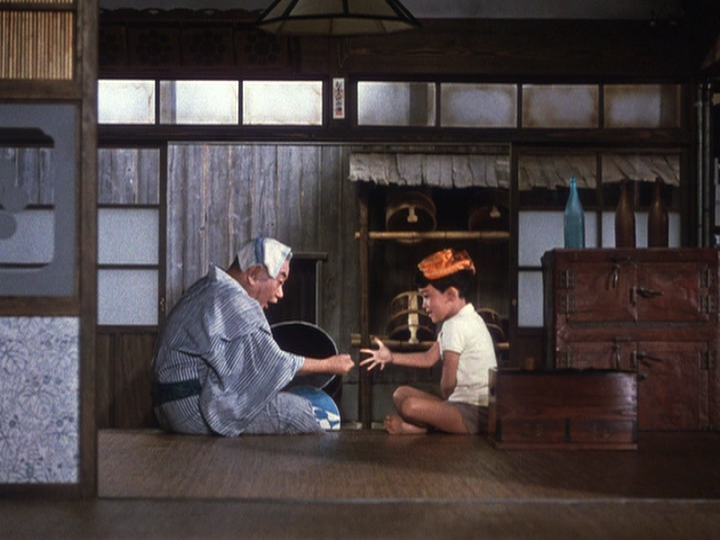 The Eclipse DVD (part of the Late Ozu box set) is a bit more pinkish than the Japanese DVD, but looks infinitely better than a ghastly UK DVD (released by Artificial Eye) and has very good subtitles (though a stray line gets missed here and there). No extras -- but I think this film can "speak for itself" to any attentive viewer.
The Eclipse DVD (part of the Late Ozu box set) is a bit more pinkish than the Japanese DVD, but looks infinitely better than a ghastly UK DVD (released by Artificial Eye) and has very good subtitles (though a stray line gets missed here and there). No extras -- but I think this film can "speak for itself" to any attentive viewer.
http://i9.photobucket.com/albums/a59/mkerpan/ozu/kohayagawa03.png
http://i9.photobucket.com/albums/a59/mkerpan/ozu/kohayagawa05.png
http://i9.photobucket.com/albums/a59/mkerpan/ozu/kohayagawa06a.png
http://i9.photobucket.com/albums/a59/mkerpan/ozu/kohayagawa07.png
http://i9.photobucket.com/albums/a59/mkerpan/ozu/kohayagawa09.png
http://i9.photobucket.com/albums/a59/mkerpan/ozu/kohayagawa12.png
http://i9.photobucket.com/albums/a59/mkerpan/ozu/kohayagawa13.png
http://i9.photobucket.com/albums/a59/mkerpan/ozu/kohayagawa14.png
http://i9.photobucket.com/albums/a59/mkerpan/ozu/kohayagawa15.png
http://i9.photobucket.com/albums/a59/mkerpan/ozu/kohayagawa16.png
http://i9.photobucket.com/albums/a59/mkerpan/ozu/kohayagawa17.png
http://i9.photobucket.com/albums/a59/mkerpan/ozu/kohayagawa18.png
Tôkyô kyôdai / Tokyo Siblings (Jun Ichikawa, 1995)
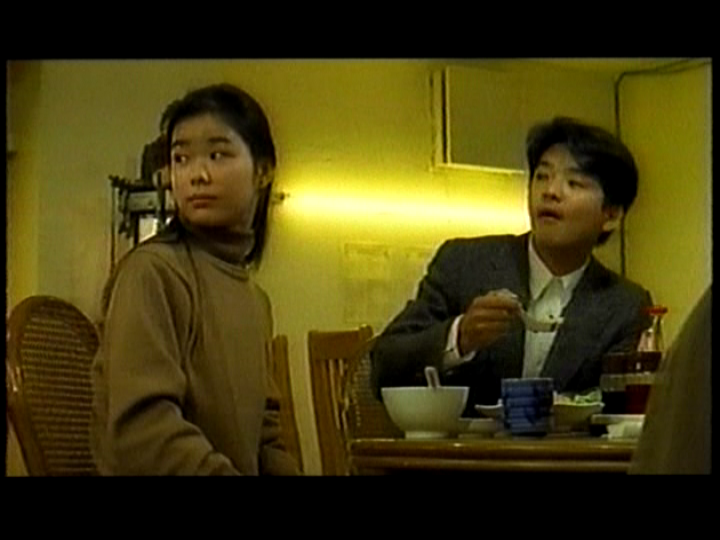 Jun Ichikawa is a self-admitted Ozu fan -- and this is generally considered to be the most Ozu-esque of his films to date. Nonetheless, Ichikawa's work here (and elsewhere -- mostly) is far less talky and far more elliptical than the work of Ozu. Tokyo Siblings shows us a slice of life of two recent orphans -- Kenichi (Naoto Ogata) a 20-something young man (who runs the family book store he inherited) and Yoko (Urara Awata), his younger sister (still in high school at the beginning of the film).
Jun Ichikawa is a self-admitted Ozu fan -- and this is generally considered to be the most Ozu-esque of his films to date. Nonetheless, Ichikawa's work here (and elsewhere -- mostly) is far less talky and far more elliptical than the work of Ozu. Tokyo Siblings shows us a slice of life of two recent orphans -- Kenichi (Naoto Ogata) a 20-something young man (who runs the family book store he inherited) and Yoko (Urara Awata), his younger sister (still in high school at the beginning of the film). 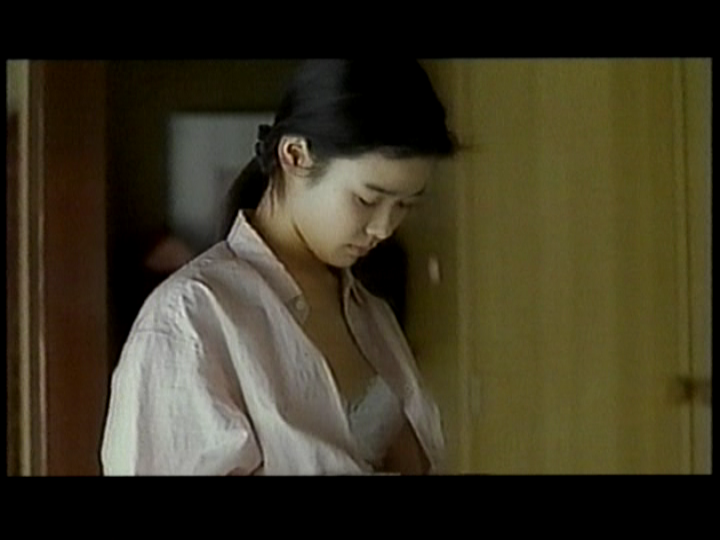 Ichikawa gives us vignettes of his character's lives, with virtually no traditional connective tissue between scenes. Kenichi's long-time girl friend breaks up with him due to his failure to make any sort of commitment to her, Yoko goes to work at a photo developing kiosk, Kenichi brings home an old school friend -- who happens to be one of Yoko's customers, Yoko and the friend fall in love, Kenichi becomes jealous, the friend is killed in an accident, brother and sister are reconciled -- at last for a while...
Ichikawa gives us vignettes of his character's lives, with virtually no traditional connective tissue between scenes. Kenichi's long-time girl friend breaks up with him due to his failure to make any sort of commitment to her, Yoko goes to work at a photo developing kiosk, Kenichi brings home an old school friend -- who happens to be one of Yoko's customers, Yoko and the friend fall in love, Kenichi becomes jealous, the friend is killed in an accident, brother and sister are reconciled -- at last for a while...
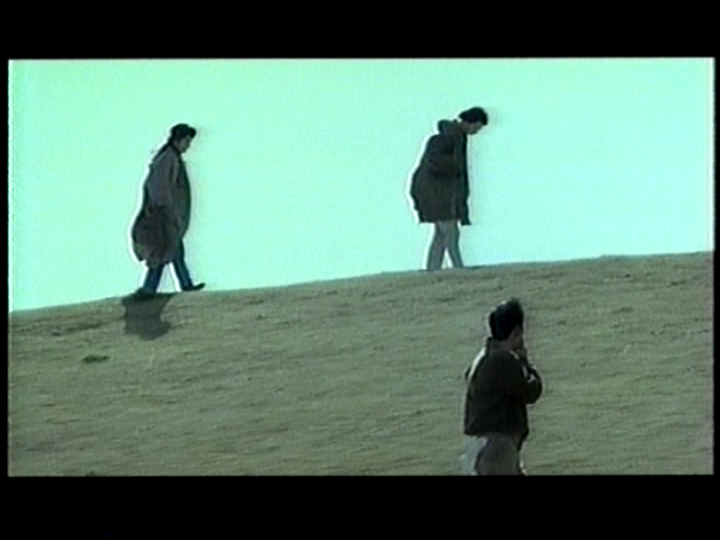 A lovely film -- and obviously a very under-stated one. Perhaps too quiet -- and reticent -- for Western tastes. Not even the small-scale success of Ichikawa's Tony Takitani seems to have ignited much Western interest in his earlier work -- or his more recent Aogeba totoshi (the name of the traditional Japanese graduation song). Sadly not really available in subbed form (and never released on DVD even in Japan).
A lovely film -- and obviously a very under-stated one. Perhaps too quiet -- and reticent -- for Western tastes. Not even the small-scale success of Ichikawa's Tony Takitani seems to have ignited much Western interest in his earlier work -- or his more recent Aogeba totoshi (the name of the traditional Japanese graduation song). Sadly not really available in subbed form (and never released on DVD even in Japan).
http://i9.photobucket.com/albums/a59/mkerpan/jul_07/kyodai01.png
http://i9.photobucket.com/albums/a59/mkerpan/jul_07/kyodai03.png
http://i9.photobucket.com/albums/a59/mkerpan/jul_07/kyodai04.png
http://i9.photobucket.com/albums/a59/mkerpan/jul_07/kyodai06.png
http://i9.photobucket.com/albums/a59/mkerpan/jul_07/kyodai08.png
New Bedford Summerfest
One of the highlights of early summer in Massachusetts is the New Bedford Summerfest (now in its ninth year). Once very small-scale and very informal, now much bigger but still quite easygoing, it allows for ample interaction with the performers. Our old friend Benoit Bourque (formerly of Matapat and Vent du Nord) was there with two friends from Maine. (I became acquainted with BB around 8 years ago, when I volunteered to be shaved by him -- with a straight razor -- while he step-danced about furiously). New finds this year a very young Scottish folk group with the unlikely name of Bodega (named after a pub in Ediburgh, I believe) and an Italian flat pick guitarist named Beppe Gambetta.
 Yamabiko Gakko was the name of a collection of personal stories written by the students of an elementary school in a mountain village. The teacher who collected the stories belonged to a movement that sought to promote truly democratic education in post-war Japan, focusing on both practical education and personal development. Imai's film is based on these stories -- and shows the methods used and the response of both children and their families to the educational program.
Yamabiko Gakko was the name of a collection of personal stories written by the students of an elementary school in a mountain village. The teacher who collected the stories belonged to a movement that sought to promote truly democratic education in post-war Japan, focusing on both practical education and personal development. Imai's film is based on these stories -- and shows the methods used and the response of both children and their families to the educational program.  While not a documentary, the film has very much the look and feel on being one. There is no plot as such, but one persistent thread deals with a good student who is often absent due to the illness of his mother. After she dies, he writes a story about her life -- and his classmates work together to illustrate and publish the story (using a mimeograph and wood block printing). An earnest and somewhat didactic film, but not an over-earnest or pedantic one. Visually, this is somewhat evocative of early Soviet cinema.
While not a documentary, the film has very much the look and feel on being one. There is no plot as such, but one persistent thread deals with a good student who is often absent due to the illness of his mother. After she dies, he writes a story about her life -- and his classmates work together to illustrate and publish the story (using a mimeograph and wood block printing). An earnest and somewhat didactic film, but not an over-earnest or pedantic one. Visually, this is somewhat evocative of early Soviet cinema.http://i9.photobucket.com/albums/a59/mkerpan/imai/gakko/yamabiko02.png
http://i9.photobucket.com/albums/a59/mkerpan/imai/gakko/yamabiko03.png
http://i9.photobucket.com/albums/a59/mkerpan/imai/gakko/yamabiko04.png
http://i9.photobucket.com/albums/a59/mkerpan/imai/gakko/yamabiko07.png
http://i9.photobucket.com/albums/a59/mkerpan/imai/gakko/yamabiko08.png
http://i9.photobucket.com/albums/a59/mkerpan/imai/gakko/yamabiko09.png
http://i9.photobucket.com/albums/a59/mkerpan/imai/gakko/yamabiko10.png
http://i9.photobucket.com/albums/a59/mkerpan/imai/gakko/yamabiko11.png
http://i9.photobucket.com/albums/a59/mkerpan/imai/gakko/yamabiko12.png
http://i9.photobucket.com/albums/a59/mkerpan/imai/gakko/yamabiko13.png
http://i9.photobucket.com/albums/a59/mkerpan/imai/gakko/yamabiko14.png
http://i9.photobucket.com/albums/a59/mkerpan/imai/gakko/yamabiko15.png
http://i9.photobucket.com/albums/a59/mkerpan/imai/gakko/yamabiko16.png
Ana / The Hole (Kon Ichikawa, 1957)
 Machiko Kyo plays a Nancy Drew-esque young reporter who gets into hot water while investigating financial hanky panky at the local level. Her troubles increase when a local bank boss (So Yamamura) and his henchman (Ichikawa stalwart Eiji Fukanoshi) come up with a plan to frame her for the murder of a witness they plan to eliminate.
Machiko Kyo plays a Nancy Drew-esque young reporter who gets into hot water while investigating financial hanky panky at the local level. Her troubles increase when a local bank boss (So Yamamura) and his henchman (Ichikawa stalwart Eiji Fukanoshi) come up with a plan to frame her for the murder of a witness they plan to eliminate.  The plot here doesn't seem to make a great deal of sense, but the cast and the cinematography are both splendid. Machiko Kyo is a delight -- and gets to wear various disguises. Lots of fun here -- but it doesn't seem to have ever been released with English subtitles (I don't think it's been included in any retrospective).
The plot here doesn't seem to make a great deal of sense, but the cast and the cinematography are both splendid. Machiko Kyo is a delight -- and gets to wear various disguises. Lots of fun here -- but it doesn't seem to have ever been released with English subtitles (I don't think it's been included in any retrospective).http://i9.photobucket.com/albums/a59/mkerpan/ichikawa_kon/hole/ana01.png
http://i9.photobucket.com/albums/a59/mkerpan/ichikawa_kon/hole/ana02.png
http://i9.photobucket.com/albums/a59/mkerpan/ichikawa_kon/hole/ana03.png
http://i9.photobucket.com/albums/a59/mkerpan/ichikawa_kon/hole/ana04.png
http://i9.photobucket.com/albums/a59/mkerpan/ichikawa_kon/hole/ana05.png
http://i9.photobucket.com/albums/a59/mkerpan/ichikawa_kon/hole/ana06.png
http://i9.photobucket.com/albums/a59/mkerpan/ichikawa_kon/hole/ana08.png
http://i9.photobucket.com/albums/a59/mkerpan/ichikawa_kon/hole/ana09.png
http://i9.photobucket.com/albums/a59/mkerpan/ichikawa_kon/hole/ana10.png
http://i9.photobucket.com/albums/a59/mkerpan/ichikawa_kon/hole/ana11.png
http://i9.photobucket.com/albums/a59/mkerpan/ichikawa_kon/hole/ana12.png
http://i9.photobucket.com/albums/a59/mkerpan/ichikawa_kon/hole/ana13.png
http://i9.photobucket.com/albums/a59/mkerpan/ichikawa_kon/hole/ana14.png
http://i9.photobucket.com/albums/a59/mkerpan/ichikawa_kon/hole/ana15.png
http://i9.photobucket.com/albums/a59/mkerpan/ichikawa_kon/hole/ana17.png
http://i9.photobucket.com/albums/a59/mkerpan/ichikawa_kon/hole/ana18.png
http://i9.photobucket.com/albums/a59/mkerpan/ichikawa_kon/hole/ana19.png
http://i9.photobucket.com/albums/a59/mkerpan/ichikawa_kon/hole/ana20.png
http://i9.photobucket.com/albums/a59/mkerpan/ichikawa_kon/hole/ana21.png
Watashi wa kani ni naritai / I Want to Be a Shellfish (Shinobu Hashimoto, 1959)
 Hashimoto is best known as one of Japan's leading screenplay writer (for films of Kurosawa, Kobayashi and Nomura, among others). This film, however, was the first of two actually directed by him as well. It tells the story of a provincial barber (played by popular comedian Frankie Sakai) who is ordered to kill a captured bomber crew member, while serving as a common soldier during World War II. After the war, he returns home to his wife (Michiyo Aratama) and child and barber shop, only to be arrested as a war criminal.
Hashimoto is best known as one of Japan's leading screenplay writer (for films of Kurosawa, Kobayashi and Nomura, among others). This film, however, was the first of two actually directed by him as well. It tells the story of a provincial barber (played by popular comedian Frankie Sakai) who is ordered to kill a captured bomber crew member, while serving as a common soldier during World War II. After the war, he returns home to his wife (Michiyo Aratama) and child and barber shop, only to be arrested as a war criminal.  The occupation military has no sympathy for his (absolutely truthful) claim that refusing his commanding officer's order to kill the prisoner would have been punishable by summary execution. His family and friends are stunned when they hear the news. Crushed at first, he and his wife recover their spirits as they begin to think his sentence might be commuted. No clemency arrives, and Chishu Ryu, as a Buddhist priest (possibly his debut in a type of role he would play many times in later years), tries to prepare him for his miserable fate.
The occupation military has no sympathy for his (absolutely truthful) claim that refusing his commanding officer's order to kill the prisoner would have been punishable by summary execution. His family and friends are stunned when they hear the news. Crushed at first, he and his wife recover their spirits as they begin to think his sentence might be commuted. No clemency arrives, and Chishu Ryu, as a Buddhist priest (possibly his debut in a type of role he would play many times in later years), tries to prepare him for his miserable fate. I was shocked to learn that the US military courts did indeed execute common soldiers for following orders that they could not legally refuse (under Japanese law). I was also surprised to learn that such soldiers were tried for murder (and convicted) even when prisoners they were ordered to execute had been found guilty of war crimes by Japanese military tribunals (and bombing civilian targets WAS a capital crime under international law at that time). Many high-ranking officials escaped punishment, as they could afford expert legal representation -- but low-ranking individuals were not so fortunate.
I was shocked to learn that the US military courts did indeed execute common soldiers for following orders that they could not legally refuse (under Japanese law). I was also surprised to learn that such soldiers were tried for murder (and convicted) even when prisoners they were ordered to execute had been found guilty of war crimes by Japanese military tribunals (and bombing civilian targets WAS a capital crime under international law at that time). Many high-ranking officials escaped punishment, as they could afford expert legal representation -- but low-ranking individuals were not so fortunate. While this film tells a compelling story and the script is a good one (there was a previous television play version -- and a new version is currently in the process of being made), Hashimoto doesn't seem to have a good sense of cinematic (as opposed to theatrical) rhythm and timing. Despite the assistance of great cinematographer Asakazu Nakai, this film often feels decidedly un-cinematic. Still, it is a wrthy enough effort -- and it would be nice if there was an English-subbed version.
While this film tells a compelling story and the script is a good one (there was a previous television play version -- and a new version is currently in the process of being made), Hashimoto doesn't seem to have a good sense of cinematic (as opposed to theatrical) rhythm and timing. Despite the assistance of great cinematographer Asakazu Nakai, this film often feels decidedly un-cinematic. Still, it is a wrthy enough effort -- and it would be nice if there was an English-subbed version.http://i9.photobucket.com/albums/a59/mkerpan/jul_07/shellfish01.png
http://i9.photobucket.com/albums/a59/mkerpan/jul_07/shellfish04.png
http://i9.photobucket.com/albums/a59/mkerpan/jul_07/shellfish06.png
http://i9.photobucket.com/albums/a59/mkerpan/jul_07/shellfish07.png
http://i9.photobucket.com/albums/a59/mkerpan/jul_07/shellfish08.png
Kohayagawa-ke no aki / Autumn of the Kohyagawa Family / End of Summer (Yasujiro Ozu, 1961)
 For some reason, critical commentators typically refer to this as one of Ozu's bleakest films -- and claim this is one of his most conservative as well. In fact, though the patriarch of the family (and the family brewery business) is an engaging codger (played by kabuki star Ganjiro Nakamura), he is also selfish and irresponsible. Although loved well-enough by his family, he is nonetheless a blighting influence --
For some reason, critical commentators typically refer to this as one of Ozu's bleakest films -- and claim this is one of his most conservative as well. In fact, though the patriarch of the family (and the family brewery business) is an engaging codger (played by kabuki star Ganjiro Nakamura), he is also selfish and irresponsible. Although loved well-enough by his family, he is nonetheless a blighting influence --  especially as regards the unmarried females of the family, his widowed daughter-in-law (Setsuko Hara) and his youngest daughter (Yôko Tsukasa). He is pressuring both women into marital arrangements that they oppose. He also is driving his eldest daughter (Michiyo Aratama) and her good-natured husband (Keiju Kobayashi) to distraction.
especially as regards the unmarried females of the family, his widowed daughter-in-law (Setsuko Hara) and his youngest daughter (Yôko Tsukasa). He is pressuring both women into marital arrangements that they oppose. He also is driving his eldest daughter (Michiyo Aratama) and her good-natured husband (Keiju Kobayashi) to distraction.  As it turns out, the patriarch (whose wife died a year earlier) had run into an old flame (Chieko Namiwa) by accident -- and he now sneaks off to visit her and his purported daughter (Reiko Dan). This daughter has a fondness for young American men (played by various Europeans with quite non-American accents) -- and is always trying to wheedle her "father" into buying her a fur coat. The patriarch has a mild stroke, which slows him down temporarily.
As it turns out, the patriarch (whose wife died a year earlier) had run into an old flame (Chieko Namiwa) by accident -- and he now sneaks off to visit her and his purported daughter (Reiko Dan). This daughter has a fondness for young American men (played by various Europeans with quite non-American accents) -- and is always trying to wheedle her "father" into buying her a fur coat. The patriarch has a mild stroke, which slows him down temporarily.  But he soon returns to his old tricks -- and is felled by a fatal stroke while visiting his old flame. On the day of the funeral, Hara's and Tsukasa's characters can't avoid showing relief over the fact that they can now make their own choices -- Hara to remain a single parent, Tsukasa to move to the other side of Japan, to marry a former co-worker. Meanwhile, Chishu Ryu and Yuko Mochizuki, as farmers living near the crematorium, serve as a sort of Greek chorus -- along with a neighboring flock of crows.
But he soon returns to his old tricks -- and is felled by a fatal stroke while visiting his old flame. On the day of the funeral, Hara's and Tsukasa's characters can't avoid showing relief over the fact that they can now make their own choices -- Hara to remain a single parent, Tsukasa to move to the other side of Japan, to marry a former co-worker. Meanwhile, Chishu Ryu and Yuko Mochizuki, as farmers living near the crematorium, serve as a sort of Greek chorus -- along with a neighboring flock of crows. This is Ozu's second most visually gorgeous color film, right behing Floating Weeds (though all his color films are quite lovely) -- with a palette rich is greens, reds, golds and browns. (If you watch this, take the "spot the bottle of Tabasco sauce" challenge). The cinematography by Asakazu Nakai is quite fine, though not quite as extravagant as Miyagawa's work in Floating Weeds. The score by Toshiro Mayufumi is often wonderful (with a sort of jazzy, Kurt Weill-ish sound), but other times (especially near the end) atypically over-bearing in a very un-Ozu-like fashion (
This is Ozu's second most visually gorgeous color film, right behing Floating Weeds (though all his color films are quite lovely) -- with a palette rich is greens, reds, golds and browns. (If you watch this, take the "spot the bottle of Tabasco sauce" challenge). The cinematography by Asakazu Nakai is quite fine, though not quite as extravagant as Miyagawa's work in Floating Weeds. The score by Toshiro Mayufumi is often wonderful (with a sort of jazzy, Kurt Weill-ish sound), but other times (especially near the end) atypically over-bearing in a very un-Ozu-like fashion ( perhaps Ozu did not have the final word on the music here -- as he was on loan to Toho for this film). The acting is first-rate -- including the supporting roles. Toho super-star Hisaya Morishige, taking advantage of Ozu's one-time-only"visit" to Toho, practically insisted on being included -- his "reward" was the role of Hara's rich but boorish suitor (who is egged on by her bumptious uncle-in-law Daisuke Kato). Anyone who believes that Ozu is a deeply "serious" director has never seen Morishige's flame-throwing Zippo lighter.
perhaps Ozu did not have the final word on the music here -- as he was on loan to Toho for this film). The acting is first-rate -- including the supporting roles. Toho super-star Hisaya Morishige, taking advantage of Ozu's one-time-only"visit" to Toho, practically insisted on being included -- his "reward" was the role of Hara's rich but boorish suitor (who is egged on by her bumptious uncle-in-law Daisuke Kato). Anyone who believes that Ozu is a deeply "serious" director has never seen Morishige's flame-throwing Zippo lighter. The Eclipse DVD (part of the Late Ozu box set) is a bit more pinkish than the Japanese DVD, but looks infinitely better than a ghastly UK DVD (released by Artificial Eye) and has very good subtitles (though a stray line gets missed here and there). No extras -- but I think this film can "speak for itself" to any attentive viewer.
The Eclipse DVD (part of the Late Ozu box set) is a bit more pinkish than the Japanese DVD, but looks infinitely better than a ghastly UK DVD (released by Artificial Eye) and has very good subtitles (though a stray line gets missed here and there). No extras -- but I think this film can "speak for itself" to any attentive viewer.http://i9.photobucket.com/albums/a59/mkerpan/ozu/kohayagawa03.png
http://i9.photobucket.com/albums/a59/mkerpan/ozu/kohayagawa05.png
http://i9.photobucket.com/albums/a59/mkerpan/ozu/kohayagawa06a.png
http://i9.photobucket.com/albums/a59/mkerpan/ozu/kohayagawa07.png
http://i9.photobucket.com/albums/a59/mkerpan/ozu/kohayagawa09.png
http://i9.photobucket.com/albums/a59/mkerpan/ozu/kohayagawa12.png
http://i9.photobucket.com/albums/a59/mkerpan/ozu/kohayagawa13.png
http://i9.photobucket.com/albums/a59/mkerpan/ozu/kohayagawa14.png
http://i9.photobucket.com/albums/a59/mkerpan/ozu/kohayagawa15.png
http://i9.photobucket.com/albums/a59/mkerpan/ozu/kohayagawa16.png
http://i9.photobucket.com/albums/a59/mkerpan/ozu/kohayagawa17.png
http://i9.photobucket.com/albums/a59/mkerpan/ozu/kohayagawa18.png
Tôkyô kyôdai / Tokyo Siblings (Jun Ichikawa, 1995)
 Jun Ichikawa is a self-admitted Ozu fan -- and this is generally considered to be the most Ozu-esque of his films to date. Nonetheless, Ichikawa's work here (and elsewhere -- mostly) is far less talky and far more elliptical than the work of Ozu. Tokyo Siblings shows us a slice of life of two recent orphans -- Kenichi (Naoto Ogata) a 20-something young man (who runs the family book store he inherited) and Yoko (Urara Awata), his younger sister (still in high school at the beginning of the film).
Jun Ichikawa is a self-admitted Ozu fan -- and this is generally considered to be the most Ozu-esque of his films to date. Nonetheless, Ichikawa's work here (and elsewhere -- mostly) is far less talky and far more elliptical than the work of Ozu. Tokyo Siblings shows us a slice of life of two recent orphans -- Kenichi (Naoto Ogata) a 20-something young man (who runs the family book store he inherited) and Yoko (Urara Awata), his younger sister (still in high school at the beginning of the film).  Ichikawa gives us vignettes of his character's lives, with virtually no traditional connective tissue between scenes. Kenichi's long-time girl friend breaks up with him due to his failure to make any sort of commitment to her, Yoko goes to work at a photo developing kiosk, Kenichi brings home an old school friend -- who happens to be one of Yoko's customers, Yoko and the friend fall in love, Kenichi becomes jealous, the friend is killed in an accident, brother and sister are reconciled -- at last for a while...
Ichikawa gives us vignettes of his character's lives, with virtually no traditional connective tissue between scenes. Kenichi's long-time girl friend breaks up with him due to his failure to make any sort of commitment to her, Yoko goes to work at a photo developing kiosk, Kenichi brings home an old school friend -- who happens to be one of Yoko's customers, Yoko and the friend fall in love, Kenichi becomes jealous, the friend is killed in an accident, brother and sister are reconciled -- at last for a while... A lovely film -- and obviously a very under-stated one. Perhaps too quiet -- and reticent -- for Western tastes. Not even the small-scale success of Ichikawa's Tony Takitani seems to have ignited much Western interest in his earlier work -- or his more recent Aogeba totoshi (the name of the traditional Japanese graduation song). Sadly not really available in subbed form (and never released on DVD even in Japan).
A lovely film -- and obviously a very under-stated one. Perhaps too quiet -- and reticent -- for Western tastes. Not even the small-scale success of Ichikawa's Tony Takitani seems to have ignited much Western interest in his earlier work -- or his more recent Aogeba totoshi (the name of the traditional Japanese graduation song). Sadly not really available in subbed form (and never released on DVD even in Japan).http://i9.photobucket.com/albums/a59/mkerpan/jul_07/kyodai01.png
http://i9.photobucket.com/albums/a59/mkerpan/jul_07/kyodai03.png
http://i9.photobucket.com/albums/a59/mkerpan/jul_07/kyodai04.png
http://i9.photobucket.com/albums/a59/mkerpan/jul_07/kyodai06.png
http://i9.photobucket.com/albums/a59/mkerpan/jul_07/kyodai08.png
New Bedford Summerfest
One of the highlights of early summer in Massachusetts is the New Bedford Summerfest (now in its ninth year). Once very small-scale and very informal, now much bigger but still quite easygoing, it allows for ample interaction with the performers. Our old friend Benoit Bourque (formerly of Matapat and Vent du Nord) was there with two friends from Maine. (I became acquainted with BB around 8 years ago, when I volunteered to be shaved by him -- with a straight razor -- while he step-danced about furiously). New finds this year a very young Scottish folk group with the unlikely name of Bodega (named after a pub in Ediburgh, I believe) and an Italian flat pick guitarist named Beppe Gambetta.
Comments
All of these need english subtitle releases, but Tokyo Siblings is *really* crying out for it. It's probably tied with Maboroshi for my favorite Japanese film of the 90s.
As to favorite Japanese films of the 90s, that's a tough one...
Surely "Only Yesterday" and "Ohikkoshi" would vie for top spots on my list -- along with "Maborosi" and "Tokyo Siblings" (and I'm sure I'm forgetting other essentials). But I definitely agree, Ichikawa's wonderful film does not deserve its obscurity.